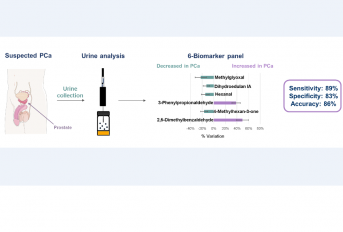Associação Portuguesa de Investigação em Cancro
Volatiloma urinário para o diagnóstico do cancro da próstata
Volatiloma urinário para o diagnóstico do cancro da próstata

The lack of a sensitive and specific biomarker for early detection of prostate cancer (PCa) is a major obstacle to the effective treatment of these patients. This study aimed to study the volatile urinary metabolic profile of PCa patients (n=58) and control individuals (cancer-free, n=60), to identify a potential panel of biomarkers for non-invasive PCa detection. The results obtained revealed a panel of biomarkers with 6 volatile compounds, which was able to identify this type of cancer with a sensitivity, specificity and accuracy of 89%, 83% and 86%, respectively. Indeed, this 6-biomarker panel outperformed the sensitivity and accuracy of prostate specific antigen (PSA), which is the most frequently used biomarker for PCa screening in clinical practice.
Authors and Afiliations:
Lima AR1, Pinto J2, Azevedo AI2, Barros-Silva D3, Jerónimo C3,4, Henrique R3,4,5, de Lourdes Bastos M2, Guedes de Pinho P6, Carvalho M7,8
1 UCIBIO/REQUIMTE, Department of Biological Sciences, Laboratory of Toxicology, Faculty of Pharmacy, University of Porto, Porto, Portugal.
2>UCIBIO/REQUIMTE, Department of Biological Sciences, Laboratory of Toxicology, Faculty of Pharmacy, University of Porto, Porto, Portugal.
3Cancer Biology Epigenetics Group, Research Center (CI-IPOP) Portuguese Oncology Institute of Porto (IPO Porto), Porto, Portugal.
4 Department of Pathology and Molecular Immunology-Biomedical Sciences Institute (ICBAS), University of Porto, Porto, Portugal.
Department of Pathology, Portuguese Oncology Institute of Porto (IPO Porto), Porto, Portugal.
6 UCIBIO/REQUIMTE, Department of Biological Sciences, Laboratory of Toxicology, Faculty of Pharmacy, University of Porto, Porto, Portugal.
7UCIBIO/REQUIMTE, Department of Biological Sciences, Laboratory of Toxicology, Faculty of Pharmacy, University of Porto, Porto, Portugal.
8 UFP Energy, Environment and Health Research Unit (FP-ENAS), University Fernando Pessoa, Porto, Portugal.
Abstract:
Background: The lack of sensitive and specific biomarkers for early detection of prostate cancer (PCa) is a major hurdle to improve patient management. Methods: A metabolomics approach based on GC-MS was used to investigate the performance of volatile organic compounds (VOCs) in general and, more specifically, volatile carbonyl compounds (VCCs) present in urine as potential markers for PCa detection. Results: Results showed that PCa patients (n=40) can be differentiated from cancer-free subjects (n=42) based on their urinary volatile profile in both VOCs and VCCs models, unveiling significant differences in the levels of several metabolites. The models constructed were further validated using an external validation set (n=18 PCa and n=18 controls) to evaluate sensitivity, specificity and accuracy of the urinary volatile profile to discriminate PCa from controls. The VOCs model disclosed 78% sensitivity, 94% specificity and 86% accuracy, whereas the VCCs model achieved the same sensitivity, a specificity of 100% and an accuracy of 89%. Our findings unveil a panel of 6 volatile compounds significantly altered in PCa patients’ urine samples that was able to identify PCa, with a sensitivity of 89%, specificity of 83%, and accuracy of 86%.Conclusions: It is disclosed a biomarker panel with potential to be used as a non-invasive diagnostic tool for PCa.
Journal: British Journal of Cancer




